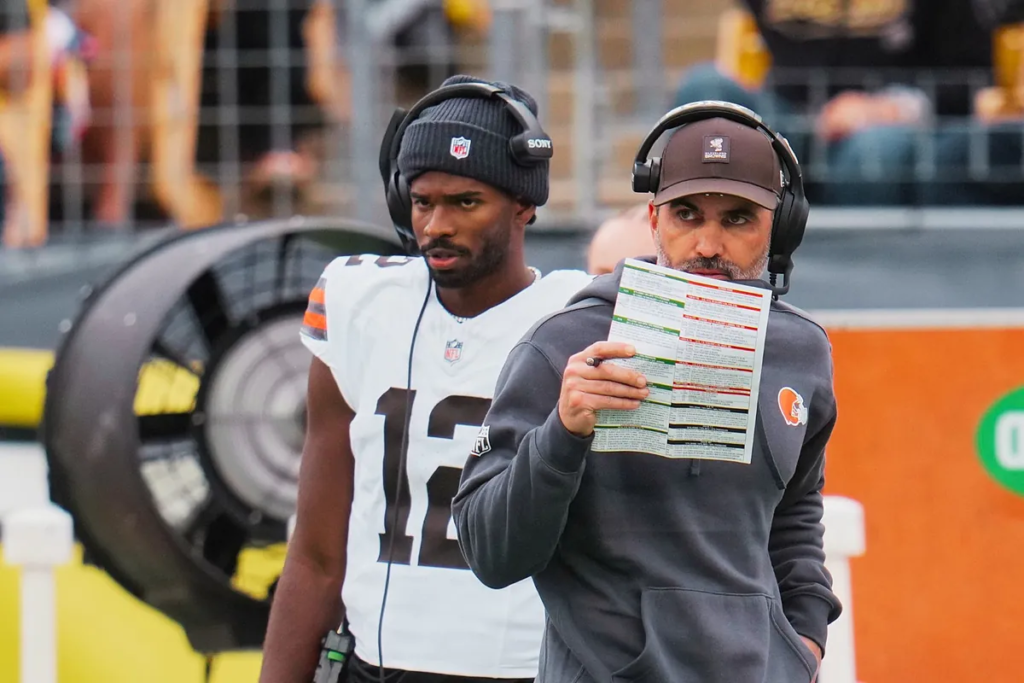The quarterback situation in Cleveland has turned into an unexpected talking point across the NFL. The Cleveland Browns have drawn sharp criticism after reports emerged that rookie quarterback Shedeur Sanders was left out of first-team practice reps.
The move, described by some insiders as “disrespectful,” has fueled growing debate about the team’s handling of one of the most highly anticipated young players in the league.
According to multiple reports, Sanders spent the day taking only second-team reps while the starting snaps went to Dillon Gabriel, who replaced Joe Flacco as starter when he left for the Cincinnati Bengals.
Head coach Kevin Stefanski told reporters that “with a young quarterback, with Dillon starting, you want to make sure he gets a lot of the reps.” The Browns’ head coach added that Sanders is “still getting reps in a bunch of periods.”
For many observers, this decision comes as a surprise given the public excitement surrounding Sanders‘ arrival. He was widely expected to push for early playing time and potentially challenge the quarterback depth chart sooner rather than later.
“Leaving him out of those reps doesn’t just slow his development,” one analyst noted. “It sends a message – and not necessarily a good one – about how the team views his role in the short term.”
Decision raises questions about respect and opportunity
For fans and analysts alike, the decision by the Browns has less to do with short-term depth chart structure and more to do with optics.
Sanders entered the league with massive attention and high expectations after a standout college career. Many saw him as a quarterback capable of developing into a franchise cornerstone.
The Browns, however, appear to be taking a cautious approach. While it’s not uncommon for rookies to work with second units, leaving a player with Sanders‘ profile completely out of first-team action has been seen as unusual.
For a young quarterback, those reps can be critical for building timing with receivers and gaining the trust of the coaching staff. Yet critics of the decision argue that the Browns risk alienating both the player and segments of the fan base.
Sanders has quickly become one of the most recognizable young figures in football. Many believe that his presence has the potential to inject new energy into the franchise. Being excluded from key practice opportunities sends a message that feels at odds with that potential.
Supporters of the team’s decision argue that it reflects a standard developmental path and that Gabriel remains the entrenched starter. But the debate has clearly grown beyond just football strategy – it’s now about perception, fairness, and how elite prospects are treated upon entering the league.
Sanders posted a cryptic response on social media, writing: “The greatest lesson I’ve learned through it all is not to worry but to lean on and trust GOD in every situation. Even when I don’t know what to do, I’ve learned that GOD will always guide me.”
He made several more references to his faith, ending the post with a hint that he will continue to be patient and wait for his chance with the Browns.
The stakes for the Browns and Sanders
This is not the first time a high-profile rookie has found himself in a tug-of-war between expectations and team structure. In this case, however, the situation is magnified because of the unique star power surrounding Sanders.
As the son of Deion Sanders, his arrival in the NFL came with intense national attention, and his performances at the college level only amplified those expectations.
The Browns‘ decision may not be final, but it could shape the tone of his rookie season. If Sanders remains on the second unit for an extended stretch, the questions about trust and opportunity will only grow louder.
At the same time, if he earns first-team reps later in camp, the early controversy might become a footnote in his development story.
Read the full article here

